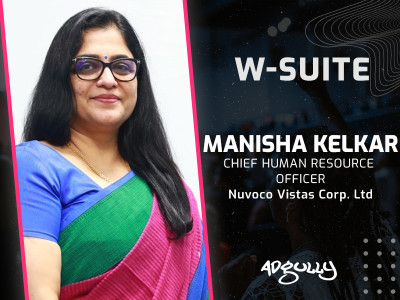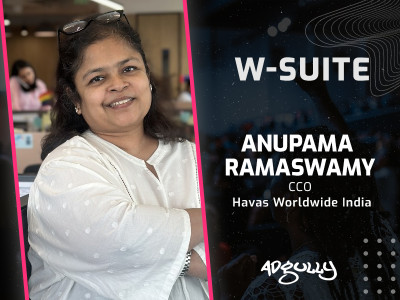Women are naturally wired for the best handling of crisis management: Swati Ganguly
We, at Adgully, have always saluted and honoured women managers and leaders across diverse fields. W-SUITE is a special initiative from Adgully that has been turning the spotlight on some of the most remarkable women achievers in the M & E, Advertising & Marketing, PR & Communication industry. In the refurbished series, we seek to find out how women leaders have been managing their teams and work as well as how they have been navigating through the toughest and most challenging times brought about by the global pandemic.
Swati Ganguly, Co-founder, Edufiq, is a catalyst for transforming learning techniques in schools via technology. It was with this very passion that she co-founded Edufiq, an EdTech start-up for courseware solutions on Artificial Intelligence through a revolutionary “game-based” and “experiential learning” platform for school-going students. The course will further create and deliver highly intensive bespoke training solutions for K12 schools, colleges, and universities.
In an exclusive conversation with Adgully, Swati Ganguly speaks about her journey from being a teacher to starting her own venture, the resilience and patience of women that make them the best crisis managers, gender sensitivity and inclusion in the new normal, and more.
How do you think the role and scope of women leaders have widened in the post-pandemic world?
The pandemic has been a great teacher. It brought back human values and empathy in the society. The value of life has been understood and brought to the forefront. Organisations have worked extremely hard to accommodate and support their employees and families. Whenever we have looked for empathy and care, the first people we have always found are the female folks of our family. Women have always been the most understanding and caring souls around our family and friends.
Our workplaces have changed, they have become more employee-centric and have started to value employees as the most critical resource. In an environment that’s changing for the good and is more connected, women will always be the best leaders to drive this change. The corporate workplace is now a close family and getting employees to connect as family members. Women will be at the core of this change and help create a culture that’s more employee-centric and people-oriented.
The rapid transition to digital, an uncertain economic landscape, charting unknown waters, working from home – how have you been navigating during the COVID-19 times? How are you maintaining work-life balance in the new normal?
I have been an educationist for 25 years, and during these 25 years, one thing that I have always valued is a very healthy work-life balance. A healthy work-life balance, even without a pandemic, will always help one grow and excel in professional life. I have always strived to bring that culture of a constructive work-life balance in Juana also.
Eight years back when I started this organisation, along with my Co-founder, Mr Osborne Dsouza, I wanted to bring technology to day-to-day education. I always believed that technology could be the only path for education to be more experiential and effective. I have been an advocate of using tech in the new age teaching and learning process. During these eight years, I have seen technology help me immensely and bring greater productivity. At Juana, we help the education ecosystem adopt the latest technology and use them effectively.
The adoption of technology in the education ecosystem was sudden and unplanned. We have helped thousands of educational institutions during these times to adopt and use tech. From attending virtual meetings to setting up the tech infrastructure and training educators to use them, it has been a tiring journey during the pandemic, but a rewarding one too. I am happy that we have been able to bring a positive change to the system, even if that resulted in longer working hours for the whole team. I am happy that we at Juana were able to help schools and Higher education institutions when they needed it the most.
Multiple studies have shown how women leaders performed better during the COVID-19 crisis. According to you, what makes women the best in crisis management?
Women have always been the stronger folk, emotionally and mentally. It is this part of their personality that has helped them to maintain the bravest face in times of crisis. The changes during Covid were unplanned and unaccounted for. We were not prepared and we still walked out stronger. Women are naturally wired for the best handling of crisis management. The best approach to managing a crisis is staying calm in the face of the crisis and to be able to make logical decisions. I have always believed that women are, and will continue to be the best Crisis Management professionals in the corporate world.
What are the five most effective lessons that you have learned as a woman leader?
It’s never too late: It’s never too late to bring a positive change. It is never late to chase your dreams and what you believe in. I started Juana at the age of 50, as I felt very strongly about the need for Technology in Education.
Be the change: I felt strongly about the need for technology to improve the quality of education in India. I was a teacher and principal and I adopted technology first before I started advocating the same.
Everyone is Gifted: Everyone is differently gifted, the key to success is to identify the strengths of each individual and guide them to a successful path.
Being Focused: The key to success is to identify problems and make a detailed plan to get them executed. A clear focus on defined goals is the key to success in any work we take up.
Give back to the Society: As a teacher and special educator, I have always believed that I have a responsibility to make this world a better place. We should dedicate some hours of our life to make this a reality. Juana Foundation is our humble effort of making this a reality.
Gender sensitivity and inclusion in the new normal – how can organizations effectively encourage and groom women leaders in challenging times?
Gender sensitivity and an inclusive workplace have always been there in the industry I come from. In the education industry, the ration of males to females is almost at 50%. What has changed in the pandemic, I believe, is those male folks are now more understanding of the fact that managing home is a critical task too. I think it will help drive leadership positions for women across other industries too. The education industry is led by women equally and our children are a testament to the wonderful work that’s happening through educators and principals. I believe it is time that organisations put more confidence in women leaders and provide them with a level playing field, keeping in mind that inclusive workplaces build a culture that’s enduring and progressive.

















Share
Facebook
YouTube
Tweet
Twitter
LinkedIn